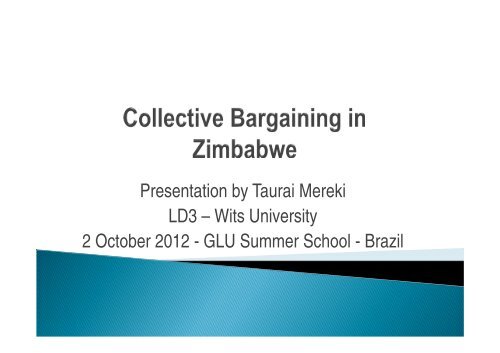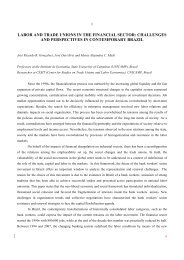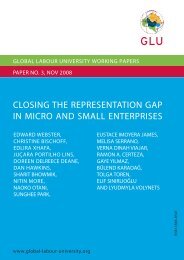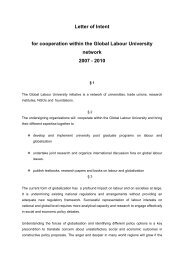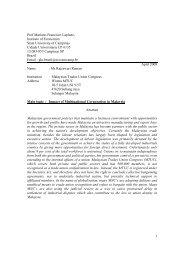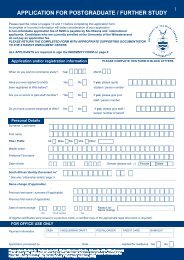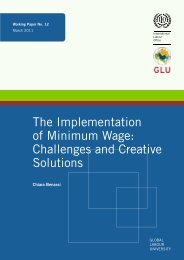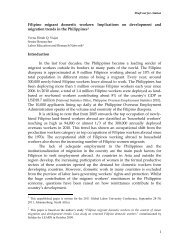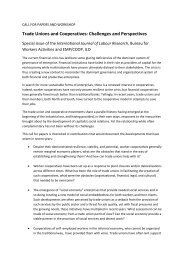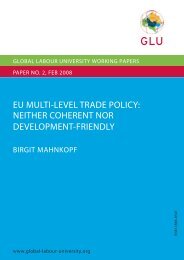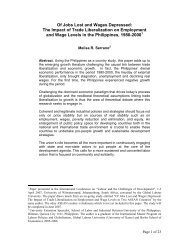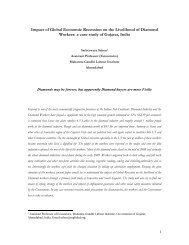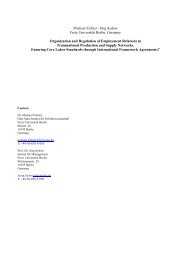Collective Bargaining in Zimbabwe - The Global Labour University
Collective Bargaining in Zimbabwe - The Global Labour University
Collective Bargaining in Zimbabwe - The Global Labour University
Create successful ePaper yourself
Turn your PDF publications into a flip-book with our unique Google optimized e-Paper software.
Presentation by Taurai Mereki<br />
LD3 – Wits <strong>University</strong><br />
2 October 2012 - GLU Summer School - Brazil
Issues of collective barga<strong>in</strong><strong>in</strong>g are as laid down <strong>in</strong> the<br />
ILO Convention 154<br />
<strong>Zimbabwe</strong> has a dual labour system:<br />
1. Workers <strong>in</strong> the Private Sector and State owned<br />
enterprises are covered under the <strong>Labour</strong> Relations<br />
Act [Chapter 28:01]<br />
2. Civil servants are governed under the Country‘s<br />
Constitution [Section 73; 74 And 75] that give<br />
precedence to the creation of Public Service<br />
Commission and Health Services Board for Health<br />
Profession. Govern<strong>in</strong>g Act be<strong>in</strong>g Public Services Act
<strong>Collective</strong> barga<strong>in</strong><strong>in</strong>g <strong>in</strong> <strong>Zimbabwe</strong> takes place at two<br />
levels i.e. at company level and at sector level<br />
Company level CB is done between management and the<br />
workers committee and has to be ratified by the union<br />
where it exists<br />
Sector level CB has the force of law subject to<br />
registration of the CBA
<strong>Labour</strong> Act:<br />
Allows for the formation of trade unions as provided<br />
for <strong>in</strong> the national constitution under section 21<br />
[freedom of assembly and association]<br />
It provides structures and procedures for collective<br />
barga<strong>in</strong><strong>in</strong>g between employer or employer’s<br />
organizations and worker’s committee or trade unions.
Public Service Commission and Health Services Board<br />
Trade unions are not recognised, but staff associations.<br />
Associations’ duty is to recommend and consult<br />
<strong>The</strong>re are no provisions for collective barga<strong>in</strong><strong>in</strong>g<br />
Decisions about the conditions of work is the sole<br />
responsibility of employer as provided for <strong>in</strong> the<br />
constitution and Public Services Act
<strong>The</strong> law states that parties are allowed to barga<strong>in</strong> on any<br />
conditions of employment which are of mutual <strong>in</strong>terest to<br />
them<br />
Examples of barga<strong>in</strong>able issues <strong>in</strong>clude rate of<br />
remuneration, m<strong>in</strong>imum wages, conditions of<br />
employment, hours of work, occupational safety<br />
requirements, dispute settlement procedures among<br />
others.<br />
Obviously matters not related to conditions of<br />
employment are not discussed
For state workers, the laws that govern them <strong>in</strong>fr<strong>in</strong>ge on<br />
their rights as spelt out by conventions 87 and 98.<br />
Workers are denied an opportunity to determ<strong>in</strong>e their<br />
direction and their future and to improve their standard of<br />
liv<strong>in</strong>g<br />
While those covered under the labour Act have right to<br />
barga<strong>in</strong> with their employer, the same law give the M<strong>in</strong>ister<br />
of <strong>Labour</strong> powers to designate any <strong>in</strong>dustry or sector an<br />
essential service provider.<br />
<strong>The</strong> right to strike is limited as the law bars almost all<br />
sectors from strik<strong>in</strong>g as they are classified as essential<br />
service
For non-state workers, Section 75 of the <strong>Labour</strong> Act<br />
provides for an obligation to negotiate <strong>in</strong> good faith<br />
Also section 76 urges the employer to disclose his<br />
f<strong>in</strong>ancial position hence <strong>in</strong>ability to pay should be<br />
f<strong>in</strong>ancially supported<br />
Failure to negotiate <strong>in</strong> good faith is an unfair labour<br />
practice<br />
For state workers, there is no framework for collective<br />
barga<strong>in</strong><strong>in</strong>g.<br />
Agreements reached dur<strong>in</strong>g consultations are not<br />
b<strong>in</strong>d<strong>in</strong>g; the employer has no obligation to honour them
State workers have no remedy if the employer refuses to barga<strong>in</strong><br />
because they are excluded from CB laws.<br />
Non-state workers have three options: strike, voluntary<br />
arbitration and compulsory arbitration<br />
However, strik<strong>in</strong>g is difficult s<strong>in</strong>ce there is a long procedure to<br />
be followed before workers can embark on <strong>in</strong>dustrial action.<br />
Moreover the state at times use the Public Order and Security<br />
Act a replica of colonial LOMA to disrupt peaceful and legitimate<br />
demands from the workers.<br />
<strong>The</strong> law has also classified most sectors as essential services<br />
which means workers <strong>in</strong> these sectors are henceforth barred<br />
from embark<strong>in</strong>g on <strong>in</strong>dustrial action
Dispute<br />
Conciliation<br />
(30 days)<br />
Voluntary<br />
Arbitration<br />
Compulsory<br />
Arbitration<br />
Strike(14 days<br />
notice)<br />
High Court<br />
<strong>Labour</strong> Court<br />
(Appeal/Review)<br />
Supreme Court
What is the situation?<br />
<strong>The</strong> employers (TelOne and NetOne) have opted out of the<br />
collective barga<strong>in</strong><strong>in</strong>g chamber (National Employment<br />
Council) cit<strong>in</strong>g union <strong>in</strong>transigency s<strong>in</strong>ce 2010 thus no<br />
agreed CB s<strong>in</strong>ce 2010<br />
Court action has stalled negotiations <strong>in</strong> <strong>Zimbabwe</strong> Posts<br />
s<strong>in</strong>ce 2010<br />
Private cellular company Econet is also fight<strong>in</strong>g <strong>in</strong> the<br />
courts refus<strong>in</strong>g to jo<strong>in</strong> the NEC
For TelOne – the union has opted to go the<br />
voluntary arbitration route s<strong>in</strong>ce there<br />
hasn't been agreed CB s<strong>in</strong>ce 2010<br />
For ZimPosts, the union has opted to go the<br />
compulsory arbitration route and there<br />
hasn't been CB at all s<strong>in</strong>ce 2010<br />
<strong>The</strong> obvious implications are that;<br />
workers are suffer<strong>in</strong>g, they opt out of the<br />
union, collective solidarity is wan<strong>in</strong>g, union<br />
organis<strong>in</strong>g power is eroded, union f<strong>in</strong>ancial<br />
base is eroded & the union is weakened
<strong>Collective</strong> barga<strong>in</strong><strong>in</strong>g has collapsed ma<strong>in</strong>ly due to the crisis period<br />
Of 1997 – 2008, a period characterised by:<br />
State repression and restrictive laws like POSA<br />
State <strong>in</strong>terference <strong>in</strong> court of law procedures, s<strong>in</strong>ce some disputes were<br />
labelled political.<br />
Delays <strong>in</strong> deliver<strong>in</strong>g judgement by courts of law<br />
Reliance on the courts rather than CB means the system has collapsed<br />
A weak and fragmented trade union movement has also led to collapse of CB<br />
as they fail to confront the employers<br />
Hyper<strong>in</strong>flation (pre 2008) and the impact of the f<strong>in</strong>ancial crisis that affected<br />
most quarters of the world economies<br />
CB is also hard <strong>in</strong> a de <strong>in</strong>dustrialis<strong>in</strong>g economy where rate of unemployment<br />
is more than 90%<br />
CB <strong>in</strong> <strong>Zimbabwe</strong> seem to be ma<strong>in</strong>ly centred more on wage negotiation<br />
currently.
Obrigado /<br />
Thank you all


